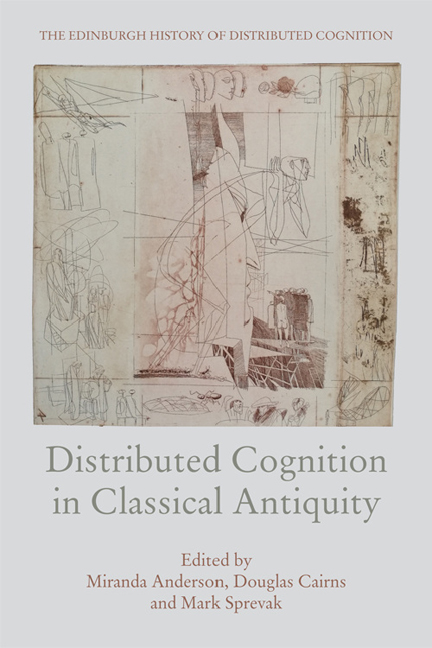Book contents
- Frontmatter
- Contents
- List of Illustrations
- Series Preface
- Miscellaneous Frontmatter
- 1 Distributed Cognition and the Humanities
- 2 Distributed Cognition and the Classics
- 3 Physical Sciences: Ptolemy's Extended Mind
- 4 Distributed Cognition and the Diffusion of Information Technologies in the Roman World
- 5 Mask as Mind Tool: A Methodology of Material Engagement
- 6 Embodied, Extended and Distributed Cognition in Roman Technical Practice
- 7 Roman-period Theatres as Distributed Cognitive Micro-ecologies
- 8 Cognition, Emotions and the Feeling Body in the Hippocratic Corpus
- 9 Enactivism and Embodied Cognition in Stoicism and Plato's Timaeus
- 10 Enargeia, Enactivism and the Ancient Readerly Imagination
- 11 Group Minds in Classical Athens? Chorus and Dēmos as Case Studies of Collective Cognition
- 12 One Soul in Two Bodies: Distributed Cognition and Ancient Greek Friendship
- 13 Distributed Cognition and its Discontents: A Dialogue across History and Artistic Genre
- Notes on Contributors
- Bibliography
- Index
6 - Embodied, Extended and Distributed Cognition in Roman Technical Practice
Published online by Cambridge University Press: 12 November 2019
- Frontmatter
- Contents
- List of Illustrations
- Series Preface
- Miscellaneous Frontmatter
- 1 Distributed Cognition and the Humanities
- 2 Distributed Cognition and the Classics
- 3 Physical Sciences: Ptolemy's Extended Mind
- 4 Distributed Cognition and the Diffusion of Information Technologies in the Roman World
- 5 Mask as Mind Tool: A Methodology of Material Engagement
- 6 Embodied, Extended and Distributed Cognition in Roman Technical Practice
- 7 Roman-period Theatres as Distributed Cognitive Micro-ecologies
- 8 Cognition, Emotions and the Feeling Body in the Hippocratic Corpus
- 9 Enactivism and Embodied Cognition in Stoicism and Plato's Timaeus
- 10 Enargeia, Enactivism and the Ancient Readerly Imagination
- 11 Group Minds in Classical Athens? Chorus and Dēmos as Case Studies of Collective Cognition
- 12 One Soul in Two Bodies: Distributed Cognition and Ancient Greek Friendship
- 13 Distributed Cognition and its Discontents: A Dialogue across History and Artistic Genre
- Notes on Contributors
- Bibliography
- Index
Summary
Introduction
Moving beyond the information-processing model of cognition characteristic of the classical computational theory of mind in philosophy, cognitive psychology, and ‘good old-fashioned artificial intelligence’ (Haugeland 1985: 112), the second-generation cognitive sciences emphasise the central – and even constitutive – role that the body and environment play in human thought. Theories of embodied cognition posit that reasoning in abstract as well as in concrete domains is underwritten by conceptual structures and cognitive processes arising from our sensory and motor interactions with the world. These structures include image schemas and their metaphorical projections. Some theorists claim that cognition in fact always happens at the interface of brain, body and world. Andy Clark and David Chalmers have articulated one of the strongest forms of this ‘transcranialist’ claim in their extended mind hypothesis, according to which the mind is literally composed of both neurological and environmental components. Theories of distributed cognition similarly highlight the ways in which human beings tend to offload cognition on to structures in their physical and social surroundings, taking advantage of whatever affordances the environment may provide for structuring and coordinating action or information. One aspect of this ‘new science of the mind’ (Rowlands 2010) that has received less attention, however, is how such embodied, extended and distributed cognitive processes cooperate in shaping behaviour in differing cultural contexts.
In this chapter, I explore several ways in which members of ancient Roman society exploited the social and, above all, physical environment as a scaffold for cognition in their technical practices, where ‘technical’ is meant to indicate practice within defined arenas of expert activity. Focusing on memorisation and (to a lesser degree) calculation and on the special challenges these activities presented within a specifically Roman cultural framework, I argue that in Latin speakers’ performance of such activities the environment did not serve merely as the ‘passive background’ against which their cognition unfolded (paraphrasing Malafouris 2013: 72). Rather, it often constituted the functional architecture upon which their cognitive processes were built. I suggest, moreover, that in carrying out some memorisation and calculation tasks, Latin speakers’ distributed cognitive strategies were mediated by the particular embodied metaphorical conceptualisations made available by their language and culture: very specifically, a system of conceptual metaphors, widely detectable in the semantics of Latin, according to which thoughts are conceived as locations and mental activity is conceived in terms of movement in space.
- Type
- Chapter
- Information
- Distributed Cognition in Classical Antiquity , pp. 96 - 120Publisher: Edinburgh University PressPrint publication year: 2017



